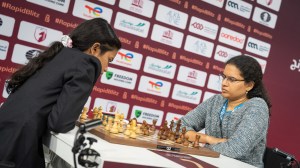Borders silent, village votes
From 2002 to 2004 has been a journey from guns to roses for the border villagers. BSF posts pockmarked with bullets are no longer visible ...

From 2002 to 2004 has been a journey from guns to roses for the border villagers. BSF posts pockmarked with bullets are no longer visible 8212; the holes have been filled and the freshly-painted walls sport a new look, much like their lives between the two elections.
The village shops which were once bare, are packed with items of everyday use. New houses are coming up and the fields are full of standing crop. Geeta Devi, along with other women of the village, unmindful of snipers at the nearby Pakistani post, hurries through her field, right on zero line, to reach the nearby panchayat ghar to caste her vote.
Constable V.K. Pandey in a nearby BSF camp has other priorities. On his way to Bakarpore Post for routine duty, Pandey carries along a stick and a snakebite kit, essential, as the vipers are venturing out of their pits due to the rising mercury.
While villagers went for voting, the loudspeakers on top of the Octroi observation post kept the sentry entertained with Punjabi and Bollywood hits. The songs also reach the Pakistani Rangers, standing about 100 metres from the post. On a few occasions, BSF personnel say the Rangers have even shouted for particular numbers to be played.
Many a BSF personnel this time are sitting in their aramgah recreation centre. Unlike the 2002 Assembly elections, their fingers are not on the trigger, they eagerly clutch the remote control of the television. 8216;8216;Sahib, I wish the ceasefire is there forever and there is no more bloodshed on the border,8217;8217; says Havildar Roshan Lal, through his lunch in the open air. During the last elections, BSF personnel recall they were firing away in retaliation to the enemy8217;s offensive, so that people could come out to vote.
Last time, Behari Lal, a vegetable vendor, could not cast his vote. Two days before Assembly elections, Lal was hit by a bullet in his right leg. 8216;8216;I have lost my leg but I have one compensation this time that I have not lost my right to vote,8217;8217; says Lal, as he went on crutches to the polling booth, a few metres from the border.
Till afternoon, only a few people turned up as most of them were busy with the wheat harvest. 8216;8216;God knows what will happen in coming days. So it is better to have our next crop to keep kitchen fire stoked,8217;8217; says Roor Dass, a village sarpanch.
- 01
- 02
- 03
- 04
- 05































